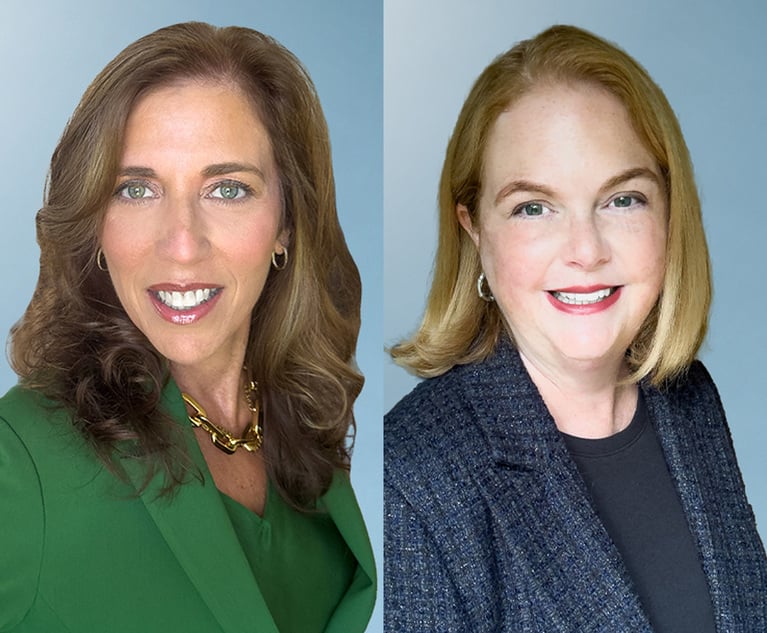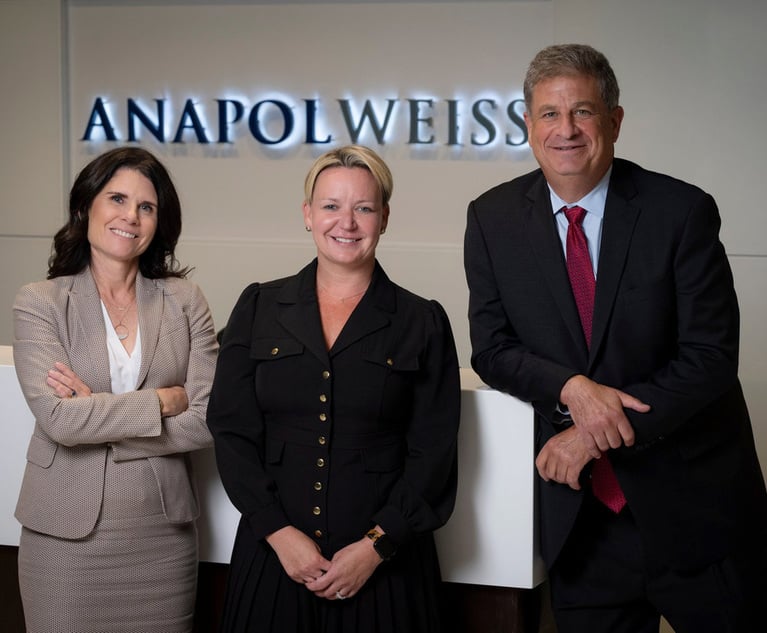'Unfinished Business' Claims Zapped by California Supreme Court in Heller Case
In a closely watched law firm bankruptcy case, the court on Monday held that dissolving firms don't have a property interest in unfinished hourly fee matters that departing partners take with them to new firms.
March 05, 2018 at 02:29 PM
5 minute read

SAN FRANCISCO — In a closely watched law firm bankruptcy case, the California Supreme Court on Monday held that dissolved firms aren't entitled to a portion of unfinished hourly fee matters that departing partners take with them to new firms.
“Any expectation the law firm had in continuing the legal matters cannot be deemed sufficiently strong to constitute a property interest allowing it to have an ownership stake in fees earned by its former partners, now situated at new firms, working on what was formerly the dissolved firm's cases,” wrote Justice Mariano-Florentino Cuéllar in a unanimous opinion.
The underlying case stems from Heller Ehrman's 2008 dissolution. The trustee charged with unwinding the Heller estate sued 16 law firms that recruited partners after the firm filed for bankruptcy, claiming that the estate was owed profits from ongoing hourly matters that partners took with them.
All but four of the firms settled. The four remaining firms—Orrick, Herrington & Sutcliffe; Jones Day; Davis Wright Tremaine; and Foley & Lardner—won a ruling in 2014 from U.S. District Judge Charles Breyer of the Northern District of California, who found that attorneys and firms don't have a property interest in ongoing client matters.
Heller's bankruptcy trustee appealed Breyer's ruling to the U.S. Court of Appeals for the Ninth Circuit, which in turn certified the following question to California's highest court in 2016: Under California law, does a dissolved law firm have a property interest in legal matters that are in progress but not completed at the time the law firm is dissolved, when the dissolved law firm had been retained to handle the matters on an hourly basis?
In Monday's opinion, Cuéllar wrote that the Heller estate was asking for an interest in matters that it didn't work on and that, in fact, it couldn't work on since it had ceased operation. “In doing so, it seeks remuneration for work that someone else now must undertake,” Cuéllar wrote. “Because such a view is unlikely to be shared by either reasonable clients or lawyers seeking to continue working on these legal matters at a client's behest, Heller's expectation is best understood as essentially unilateral.”
Cuéllar wrote that a contrary finding would make it difficult for former partners to bring unfinished matters with them to new firms and for clients to choose their own lawyer. The court, however, did hold that the Heller estate should be able to bill and collect on a “narrow category of winding up activities”—things such as filing motions for continuances, and packing and shipping client files, which were necessary to “preserve the partnership business.”
Jones Day's Shay Dvoretzky, who represented his firm at oral argument in the case late last year, said that the law firm defendants were pleased with the decision because it sided with them on an important principle. “As lawyers, we serve our clients' interest and clients own their matters—not lawyers,” he said.
Orrick's Eric Shumsky, who argued on behalf of his firm as well, said that the decision “establishes, once and for all, the commonsense proposition that the firm that does the work is the firm that gets paid.”
“It enables lawyers to move to the firms that are the best fit for them and their clients, and it makes sure that clients have control over who handles their matters and who gets paid for doing so,” Shumsky said.
Diamond McCarthy's Christopher Sullivan, who represents the Heller bankruptcy trustee, said that he was “disappointed by the ruling but proud of the fight that we put up for our clients.”
“This is the death knell to the unfinished business claims” in law firm bankruptcy, said Blank Rome's Leslie Corwin. Corwin, who drafted Heller Ehrman's dissolution plan back when he practiced at Greenberg Traurig, said that recruiting law firms wouldn't be willing to take on lawyers and staff from dissolving firms if they had to hand over profits from ongoing hourly matters.
Unfinished business claims, which had become a staple of law firm bankruptcies over the past decade or so, have recently started to fizzle in the wake of a stream of critical decisions. According to a search of public unfinished business settlements on large-firm bankruptcy dockets by The American Lawyer, firms had paid out $35.5 million to bankruptcy trustees in settlements as of October 2012.
Large law firms, however, started to fight claims rather than settle shortly thereafter. The New York Court of Appeals found in 2014 that dissolving law firms Coudert Brothers and Thelen did not have a right to hourly fees earned by former partners once at their new firms under New York law. Following that decision, two U.S. district judges in San Francisco—Breyer and James Donato—tossed out unfinished business claims in Heller Ehrman and Howrey, which were governed by California and District of Columbia partnership law, respectively. Just last week the Ninth Circuit certified a similar question to the District of Columbia Court of Appeals in the bankruptcy of IP and litigation firm Howrey.
University of California, Davis, School of Law professor Robert Hillman, the author of a treatise on lawyer mobility, said that Monday's decision treats law firms differently than other partnerships. While the decision takes into account the rights of clients to choose their own law firm, he said it ignores the rights of former employees, associates and creditors who face losses when law firms dissolve.
“I think what they've done in the opinion is continue the judiciary's creation of special rules for lawyers,” Hillman said.
This content has been archived. It is available through our partners, LexisNexis® and Bloomberg Law.
To view this content, please continue to their sites.
Not a Lexis Subscriber?
Subscribe Now
Not a Bloomberg Law Subscriber?
Subscribe Now
NOT FOR REPRINT
© 2025 ALM Global, LLC, All Rights Reserved. Request academic re-use from www.copyright.com. All other uses, submit a request to [email protected]. For more information visit Asset & Logo Licensing.
You Might Like
View All
Once the LA Fires Are Extinguished, Expect the Litigation to Unfold for Years
5 minute read

Faegre Drinker Adds Three Former Federal Prosecutors From Greenberg Traurig
4 minute read
Anapol Weiss Acquires Boutique Led by Star Litigator Alexandra Walsh
5 minute readTrending Stories
- 1Silk Road Founder Ross Ulbricht Has New York Sentence Pardoned by Trump
- 2Settlement Allows Spouses of U.S. Citizens to Reopen Removal Proceedings
- 3CFPB Resolves Flurry of Enforcement Actions in Biden's Final Week
- 4Judge Orders SoCal Edison to Preserve Evidence Relating to Los Angeles Wildfires
- 5Legal Community Luminaries Honored at New York State Bar Association’s Annual Meeting
Who Got The Work
J. Brugh Lower of Gibbons has entered an appearance for industrial equipment supplier Devco Corporation in a pending trademark infringement lawsuit. The suit, accusing the defendant of selling knock-off Graco products, was filed Dec. 18 in New Jersey District Court by Rivkin Radler on behalf of Graco Inc. and Graco Minnesota. The case, assigned to U.S. District Judge Zahid N. Quraishi, is 3:24-cv-11294, Graco Inc. et al v. Devco Corporation.
Who Got The Work
Rebecca Maller-Stein and Kent A. Yalowitz of Arnold & Porter Kaye Scholer have entered their appearances for Hanaco Venture Capital and its executives, Lior Prosor and David Frankel, in a pending securities lawsuit. The action, filed on Dec. 24 in New York Southern District Court by Zell, Aron & Co. on behalf of Goldeneye Advisors, accuses the defendants of negligently and fraudulently managing the plaintiff's $1 million investment. The case, assigned to U.S. District Judge Vernon S. Broderick, is 1:24-cv-09918, Goldeneye Advisors, LLC v. Hanaco Venture Capital, Ltd. et al.
Who Got The Work
Attorneys from A&O Shearman has stepped in as defense counsel for Toronto-Dominion Bank and other defendants in a pending securities class action. The suit, filed Dec. 11 in New York Southern District Court by Bleichmar Fonti & Auld, accuses the defendants of concealing the bank's 'pervasive' deficiencies in regards to its compliance with the Bank Secrecy Act and the quality of its anti-money laundering controls. The case, assigned to U.S. District Judge Arun Subramanian, is 1:24-cv-09445, Gonzalez v. The Toronto-Dominion Bank et al.
Who Got The Work
Crown Castle International, a Pennsylvania company providing shared communications infrastructure, has turned to Luke D. Wolf of Gordon Rees Scully Mansukhani to fend off a pending breach-of-contract lawsuit. The court action, filed Nov. 25 in Michigan Eastern District Court by Hooper Hathaway PC on behalf of The Town Residences LLC, accuses Crown Castle of failing to transfer approximately $30,000 in utility payments from T-Mobile in breach of a roof-top lease and assignment agreement. The case, assigned to U.S. District Judge Susan K. Declercq, is 2:24-cv-13131, The Town Residences LLC v. T-Mobile US, Inc. et al.
Who Got The Work
Wilfred P. Coronato and Daniel M. Schwartz of McCarter & English have stepped in as defense counsel to Electrolux Home Products Inc. in a pending product liability lawsuit. The court action, filed Nov. 26 in New York Eastern District Court by Poulos Lopiccolo PC and Nagel Rice LLP on behalf of David Stern, alleges that the defendant's refrigerators’ drawers and shelving repeatedly break and fall apart within months after purchase. The case, assigned to U.S. District Judge Joan M. Azrack, is 2:24-cv-08204, Stern v. Electrolux Home Products, Inc.
Featured Firms
Law Offices of Gary Martin Hays & Associates, P.C.
(470) 294-1674
Law Offices of Mark E. Salomone
(857) 444-6468
Smith & Hassler
(713) 739-1250






